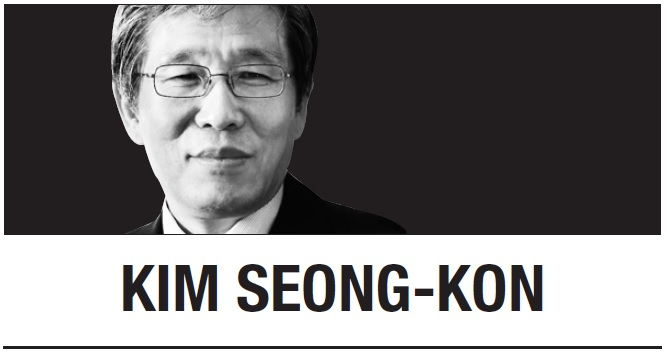
South Korea is a country where conservatism and socialism/progressivism have been at war for the past eight decades. Unfortunately, this means that there has been no room for liberalism in the Korean political arena. Surely, there are many liberals, and yet they are invisible in the whirlwind of ideological warfare between conservatives and socialists/progressivists.
Watching the chronic war, one might have the impression that the Korean people do not seem to correctly perceive the definition of political ideologies. In South Korea, for example, left-wing people think that the term “conservatives” means simply corrupt, hopelessly old-fashioned people who are only interested in protecting their inherited rights and privileges. Likewise, right-wing people think of “progressives” as pro-North Korea, pro-China Marxists who try to turn South Korea into a socialist country in which the government controls everything. Perhaps they are right, and yet such definitions do not fit authentic conservatives or true progressives.
According to the Oxford Language Dictionary, “conservatism” means “commitment to traditional values and ideas,” and its political views “favor free enterprise, private ownership and socially traditional ideas.” Very often, this amounts to privileging the protection of family, religion and property rights. Naturally, it detests socialism, communism or terrorism, all of which are grave threats to a traditional social order, religion and private property rights, among others.
The problem with conservatism is that if it goes to the extreme, it can fall into anti-immigrant sentiments, racial prejudice, regionalist biases, xenophobia and discrimination against women -- as demonstrated in the anti-abortion movement -- under the excuse of protecting one’s country, region, and moral values. In order to avoid such criticism, Korean conservatives should discard regional prejudices and embrace other regions and other people. They also need to shake off the stereotypical image that they only try to protect their own vested privileges.
The same dictionary defines “liberalism” as “willingness to respect or accept behavior or opinions different from one’s own and openness to new ideas.” Therefore, liberalism embraces cultural and ethnic diversity. It also values “individual rights, civil liberties and free enterprise.” In addition, liberalism advocates democracy, the market economy and private property rights. Accordingly, liberalism abhors totalitarianism, authoritarianism and socialism, which do not allow for a liberal mindset.
Liberalism has problems of its own as well. If pushed to the extreme, it may turn into libertinism that allows free sex, unscrupulous abortions or drug abuse, which are far from the true spirit of liberalism. Unfortunately, many people confuse liberalism with libertinism, and thus either antagonize liberalism or indulge in sex and drugs, misunderstanding the essence of liberalism.
In the US, the Republican Party subscribes to conservatism and the Democratic Party to liberalism. That is a normal phenomenon in a healthy society because conservatism and liberalism are opposites, and yet complementary, like the two sides of a coin. In South Korea, however, it is confusing because the People Power Party advocates conservatism and the Democratic Party of Korea adopts socialism and progressivism, not liberalism.
Many Koreans favor socialism and progressivism because they naively believe that it will bring forth equal opportunities and an equal distribution of wealth. However, the Oxford English Dictionary defines “socialism” as “a political and economic theory of social organization which advocates that the means of production, distribution and exchange should be owned or regulated by the community as a whole.” Since socialism advocates social ownership, opposed to private ownership, it resembles communism to a certain extent. It is no wonder that very often a former communist country will now call itself “a socialist country.”
In the countries of industrial capitalism, the health care system is problematic due to the high costs of medical bills derived from the tug of war or collusion between hospitals and insurance companies. Under the socialist medical system, however, the government will take care of medical bills. Thus, the socialist medical system looks ostensibly idealistic. In reality, however, you have to wait in a long line for a long time to see a doctor or get a surgery.
Besides, in a socialist country, the government controls everything, banning private property rights. When this happens, the country will inevitably turn into a tyrannical society in which only a few privileged political leaders wield absolute power over the people. That is why the famous American thinker Henry David Thoreau said, “The government is best which governs least.”
“Progressivism” tries to change human societies through socio-political reform. Korean progressive politicians, too, want to improve their society through a socialist revolution. One problem is that during the process they will surely turn their country into a totalitarian one.
In order to choose the right leaders who can steer our country in the right direction, we should know exactly what the above political terms mean. We do not need a political party that tries to regulate the people by banning private ownership and ruin the country by opposing free enterprise or a market economy. Instead, our politicians should try to be either genuine conservatives or idealistic liberals.
Kim Seong-kon
Kim Seong-kon is a professor emeritus of English at Seoul National University and a visiting scholar at Dartmouth College. The views expressed here are his own. -- Ed.







![[Today’s K-pop] Blackpink’s Jennie, Lisa invited to Coachella as solo acts](http://res.heraldm.com/phpwas/restmb_idxmake.php?idx=644&simg=/content/image/2024/11/21/20241121050099_0.jpg)